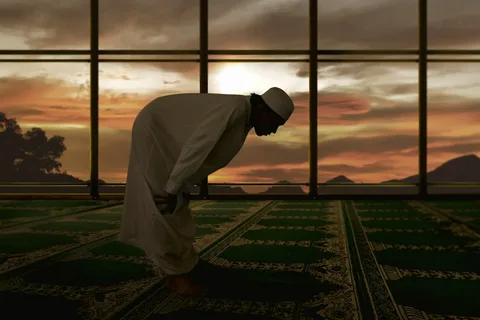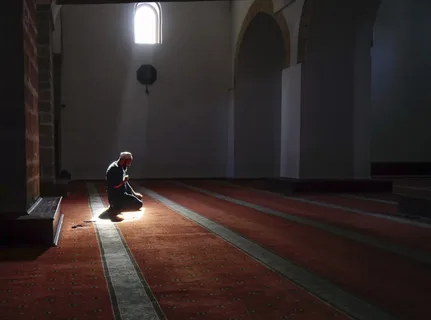In Islam, the five daily prayers, known as Salah, are obligatory for every adult Muslim. Alongside these obligatory prayers, there are additional voluntary prayers called Nafl prayers. These voluntary prayers hold significance in strengthening one’s relationship with Allah and seeking additional blessings, in this article on Arabian Tongue website we will explorer How long after fajr can you pray nafl.
Importance of Nafl Prayers

Nafl prayers, also known as supererogatory or voluntary prayers, hold significant importance in Islam, despite not being obligatory like the five daily prayers (Salah). Here are some reasons why Nafl prayers are considered important:
- Spiritual Growth: Nafl prayers offer Muslims an opportunity to enhance their spirituality and strengthen their relationship with Allah. These prayers are a means of expressing gratitude, seeking forgiveness, and seeking closeness to the Creator beyond the obligatory acts of worship.
- Following the Sunnah: The Prophet Muhammad (peace be upon him) frequently performed Nafl prayers, demonstrating their importance in Islam. By engaging in Nafl prayers, Muslims emulate the actions of the Prophet and follow his Sunnah, thereby earning additional rewards.
- Extra Rewards: While performing obligatory acts of worship is essential for a Muslim’s faith, engaging in Nafl prayers earns additional rewards (thawab). The Prophet Muhammad mentioned in various Hadiths that Allah loves those who perform voluntary acts of worship, and they serve as a means to elevate one’s spiritual status.
- Atonement for Shortcomings: Nafl prayers offer an opportunity for Muslims to make up for any deficiencies in their obligatory prayers. They serve as a way to compensate for missed prayers or any lack of focus or sincerity in the mandatory Salah.
- Protection from Evil: Engaging in Nafl prayers is believed to protect individuals from sins and evil influences. It strengthens their faith and resolve, making them more resilient against temptations and distractions in daily life.
- Seeking Guidance: Nafl prayers provide a platform for Muslims to seek guidance, blessings, and assistance from Allah in matters affecting their lives. It’s a time for introspection, supplication, and seeking divine assistance in both personal and communal affairs.
- Increased Barakah (Blessings): Performing Nafl prayers can bring barakah into one’s life. It’s believed that engaging in voluntary acts of worship can lead to increased blessings and abundance in various aspects of life, including health, wealth, and relationships.
- Preparation for the Hereafter: Just as the five daily prayers serve as preparation for the Hereafter, Nafl prayers also contribute to one’s spiritual growth and preparation for the afterlife. They serve as an additional means to earn Allah’s pleasure and secure a place in Paradise.
Timing of Nafl Prayers
Nafl prayers can be performed at various times throughout the day and night, except for specific periods when prayer is prohibited, such as during sunrise and sunset.
How Long After Fajr Can You Pray Nafl?

Among the five daily prayers, Fajr holds particular importance due to its timing and spiritual significance. After performing the Fajr prayer, Muslims often wonder about the permissibility of offering Nafl prayers and the timeframe within which they can do so.
Islamic Teachings on the Matter
In Islamic teachings, there’s no specific time limit set for when one can perform Nafl prayers after the Fajr prayer (the dawn prayer). However, there are certain etiquettes and recommendations to observe regarding the timing of Nafl prayers after Fajr:
- Prohibition of Praying at Sunrise: It’s prohibited to offer any voluntary prayers, including Nafl prayers, once the sun starts to rise until it has completely risen. This period is known as “Ishraq” time, and it lasts for about 15 to 20 minutes after sunrise. Therefore, Nafl prayers should be performed before sunrise or after this period.
- Preference for Early Morning: The Prophet Muhammad (peace be upon him) encouraged performing Nafl prayers in the early morning hours after the Fajr prayer. These prayers are known as the “Sunan al-Subh” or “Duha” prayers. They are usually performed after the obligatory Fajr prayer and before the sun rises significantly.
- Time for Ishraq and Duha Prayers: While Ishraq prayers are performed immediately after sunrise, Duha prayers can be performed after the Ishraq time until just before the Dhuhr prayer (the noon prayer). This provides a window of opportunity for engaging in Nafl prayers after Fajr.
- Recommendation to Delay After Fajr: Some scholars recommend delaying Nafl prayers after the Fajr prayer to ensure that the time for the prohibited prayer at sunrise has passed. However, it’s essential to balance this recommendation with the encouragement to perform voluntary prayers in the early morning hours.
- Flexibility and Intention: Generally, Nafl prayers can be performed at any time of the day or night, as long as they are not during the prohibited times (such as sunrise, when the sun is at its zenith, and after the Asr prayer). It’s crucial to have the intention (niyyah) of performing the Nafl prayer and to ensure that it does not coincide with any forbidden times or occasions.
General Guidelines for Nafl Prayers
Despite the variance in opinions, there are general guidelines that Muslims can follow when performing Nafl prayers after Fajr:
- It is preferable to delay Nafl prayers slightly after Fajr to distinguish them from the obligatory Salah.
- Muslims should prioritize the performance of Sunnah Mu’akkadah (emphasized Sunnah) prayers before engaging in Nafl prayers.
- Individuals can consult knowledgeable scholars or adhere to the practices of their specific Islamic school of thought for guidance on this matter.
FAQs
Can I pray Nafl immediately after Fajr?
While some scholars permit immediate Nafl prayers, it is advisable to delay them slightly for clarity between obligatory and voluntary prayers.
What are the benefits of praying Nafl after Fajr?
Praying Nafl after Fajr offers spiritual rewards, enhances mindfulness, and strengthens one's connection with Allah.
Are there specific Nafl prayers recommended after Fajr?
There are no specific Nafl prayers prescribed after Fajr, but Muslims can choose from various voluntary prayers based on personal preference and spiritual goals.
Is it better to pray Nafl before or after sunrise?
While there is flexibility in the timing of Nafl prayers, delaying them slightly after sunrise is preferable to distinguish them from the obligatory Fajr prayer.
Can I pray Nafl at any time during the day?
Yes, Nafl prayers can be performed at any time except for prohibited periods such as sunrise and sunset.
Conclusion
In conclusion, the timing of Nafl prayers after Fajr is a matter of scholarly debate within the Islamic tradition. While some scholars advocate for immediate performance, others recommend delaying them slightly to distinguish between obligatory and voluntary acts of worship. Muslims are encouraged to seek knowledge, consult knowledgeable scholars, and prioritize their spiritual growth when determining the timing of Nafl prayers after Fajr.

